本试题 “短文改错。 For a writer, there is hardly any great honour than winning the Nobel Prize for Literature. And for a woman writer, claim the prize is e...” 主要考查您对名词所有格
形容词的比较级
副词
介词和介词短语
现在分词
过去分词
一般过去时
现在完成时
一般过去时的被动语态
等考点的理解。关于这些考点您可以点击下面的选项卡查看详细档案。
- 名词所有格
- 形容词的比较级
- 副词
- 介词和介词短语
- 现在分词
- 过去分词
- 一般过去时
- 现在完成时
- 一般过去时的被动语态
名词的格的种类:
在句中表示所有关系的语法形式称为名词所有格。
例如:Tom's best friend is Mary. (Tom's 是所有格,Mary为通格)
The title of the book is interesting. (of the book为所有格)
-'s所有格的用法:
-'s所有格主要用于有生命的东西,但有时也可用于无生命的东西,这主要见于:
(1)用于表时间的名词后:
tomorrow's weather 明天的天气
two days' journey两天的旅程比较:
ten minutes' break=a ten-minute break 10分钟的休息
(2)用于表国家、城市的名词后:America's policy 美国的政策 the city's population 这个城市的人口
(3)用于某些集合名词后:the majority's view 多数人的观点 the government's policy 政府的政策
(4)用于组织机构后:the station's waiting-room 车站候车室 the newspaper's editorial policy 这家报纸的编辑方针
(5)用于度量衡及价值名词后:a mile's distance1 英里的距离 twenty dollar's value 20美元的价值
注:对于带有连字符已转化为形容词的度量衡,不能用所有格形式:ten-minute walk 10分钟的路程 (比较:ten minutes' walk)
(6)用于表天体的名词后:the moon's rays 月光 the earth's surface 地球表面
(7)用于某些固定表达中:a stone's throw 一箭之遥 at one's wit's end 黔驴技穷 at arm's length 以一臂之距 out of harm's way 在完全的地方
注:名词所有格并不一定表示所有关系,有时可能表示其他意义:
(1)表类别:a doctor's degree 博士学位,Children's hospital 儿童医院
(2)表动作执行者:Mr Smith's arrival 史密斯先生的到达
(3)表动作承受者:Children's education 儿童教育
-'s所有格与of所有格的用法比较:
(1)of 所有格既可用于有生命的人或物,也可用于无生命的东西。of 所有格有时可以与-'s所有格互换。如:
Mr Smith's son=the son of Mr Smith 史密斯先生的儿子
Jim's patience=the patience of Jim 吉姆的耐心
the Queen's arrival=the arrival of the Queen 女王的到达
(2)必须用's所有格的情形:
①表类别时:men's shoes男鞋,Children's stories儿童故事
②表来源时:John's telegram 约翰的电报
③当被修饰的名词后有同位语修饰时:
Mary's husband, a policeman, has just been here. 玛丽的丈夫是个警察,刚刚来过这儿。
(3)必须用of 所有格的情形:
①用于无生命的事物时:the subject of the sentence 句子主语
②表同位关系时:the City of Beijing 北京市
③当中心词是名词化的名词时:the life of the poor 穷人的生活
④当of 所有格中的名词后跟有后置修饰语或同位语时:
Mr Smith is a foreign teacher of a university in China.史密斯先生是中国一所大学的外籍教师。
-'s所有格的构成方法:
(1)一般情况(包括单数名词和不带词尾s的复数名词)加-'s:Children's books儿童图书 today's paper今天的报纸
(2)带词尾s的复数名词只加省字撇( ' ):girls' school女子学校 the Smiths'car 史密斯家的小汽车
注:带词尾s的单数名词,通常仍加's:the boss's plan 老板的计划 the hostess's worry女主人的担心
(3)带词尾s的人名,可加's或只加省字撇( ' ):Dickens' novels 狄更斯的小说 Charles's job查理斯的工作。
不带词尾-s却以咝音结尾者,一律加's:Marx's works 马克思的著作 George's room 乔治的房间
(4)用and连接的并列连词的所有格要分两种情况,即表示各自的所有关系时,要分别在并列连词后加-'s,表示共同的所有关系时,只在最后一个名词后加-'s:
Tom's and Jim's rooms 汤姆和吉姆(各自)的房间
Tom and Jim's rooms 汤姆和吉姆(共同)的房间
名词所有格知识体系:
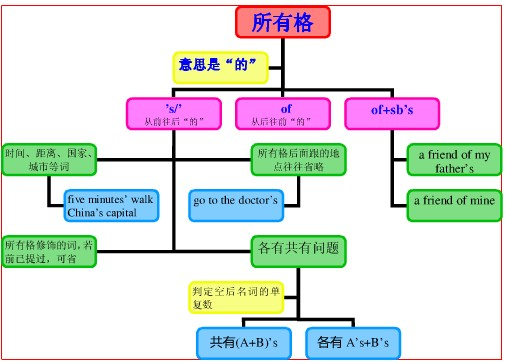
双重所有格的使用:
(1)所谓双重所有格就是指将“-'s”所有格与of 所有格结合起来一起使用: a friend of my father's 我父亲的一位朋友 a photo of Mr Smith's 史密斯先生的一张照片
(2)双重所有格的使用场合:
①当被修饰名词前有指示代词、疑问代词、不定代词或数词等限定词时,一般要用双重所有格:
如:I don't like that big nose of David's. 我不喜欢大卫的那个大鼻子。
Which novel of Dickens' are your eferring to? 你谈的是狄更斯的哪部小说?
Some friends of my brother's wil lcome. 我兄弟的一些朋友要来。
注:被双重所有格修饰名词前有指示代词时,通常带有一定的感情色彩(如赞赏或厌恶等)。
如:That little daughter of your cousin's is really a dear. 你表哥的那个小女儿真是逗人爱。(表赞赏)
That daughter of your cousin's is constantly complaining.你表哥的那个女儿老是在报怨。(表厌恶)
另外,被双重所有格修饰的名词前可以用不定冠词,但通常不用定冠词:
可以说:a poem of Shelly's, a novel o fDickens'
不能说:the poem of Shelly's, the novel of Dickens'
②有时既可用双重所有格也可用of 所有格,但含义稍有差别。
比较:a photo of Mary's 玛丽收藏的一张照片
a photo of Mary 玛丽照的一张照片
a criticism of William's 威谦提出的批评
a criticism of William 对威谦的批评
形容词比较级概念:
大多数形容词(性质形容词)有比较级,用来表示两个人或事物之间的比较“较……”。
如:I am taller than you.
形容词比较级特殊用法:
1、没有比较对象的比较结构:
所谓没有比较对象的比较结构不是指省略而言,而是指并非真正的比较。
例如:The car runs faster than110 miles. 那辆车时速为110多英里。
There is more than one solution to the problem. 这个问题的解决办法不止一个。
The daily cost in an average hospital in the United States can run as high as $250. 在美国普通医院的每天的费用可高达250美元。
2、用比较级的形式表达最高级的意思:
在这种情况下,往往是将一个人或是一件事与其他所有的人或事相比较。注意别忘了常在比较状语中用any, other, else类的字眼,以将比较主体排除在比较对象以外,因为自己不可以与自己相比较。
例如:He is taller than any one else in our class. 他在我们班比其他任何都高。
Iron is more useful than any other metals. 铁比其他任何金属更有作用。
3、no+比较级+than的结构表示“A和B一样不……”:
例如:She runs no faster than her sister.她与她妹妹一样跑不快。
Tom is no wiser than John. 汤姆和约翰一样没有聪明才智。
He is no richer than his brother. 他与他弟弟一样不富有。
4、汉语可以说“昆明的气候比兰州好”。英语必须加that:
例如:The climate of Kunming is better than that of Lanzhou.
5、英语比较级常译作“较…”、“…一些”等,但不等于汉语的“更…”。汉语的“更…”须用“still”或“even”来表示:
如:This book is even more difficult than that one. 这本书比那本书更难。
6、有些情况下,汉语不用“较”等字眼,英语则须用比较级:
如:Will the younger people give their seats to old people? 请年轻人把座位让给老年人好不好?
形容词比较级的用法:
1、比较级用于二者的比较,其结构是:含有形容词比较级的主句+从属连词than引导的从句(从句中常省去意义上和主句相同的部分)。
如:Li is older than Zhou. 李比周年纪大。(从句中省去了is old)
There are more children in this nursey than in that one. 这个托儿所的孩子比那个托儿所多。(从句中省去了there are children)
After two years' physical training, she is healthier and stronger. 经过两年的体力锻炼,她(比以前)健康强壮多了。(注意这里省去了从句than she was)
We are much better off than ever before. 我们的生活比过去任何时候都要好得多。(than后省去了we were)
Paul weighs less than harry. 保尔的体重比哈利轻。
Mary is less clever than Jane. 玛丽不如简那么聪明。
2、可修饰比较级的词:
1)a bit, a little, rather, much, far, by far, many, a lot, lots, a great deal, any, still, even等
2)还可以用表示倍数的词或度量名词作修饰语。
3)以上词(除by far)外,必须置于比较级形容词或副词的前面。
典型例题:
1)—Are you feeling ____?
—Yes,I'm fine now.
A. any well
B. any better
C. quite good
D. quite better
答案:B. any可修饰比较级,quite修饰原级,well的比较级为better.
2)The experiment was____easier than we had expected.
A. more
B. muchmore
C. much
D. moremuch
答案:C. much可修饰比较级,因此B,C都说得通,但easier本身已是比较级,不需more,因此C为正确答案。
3)If there were no examinations, we should have___at school.
A. the happiest time
B. a more happier time
C. much happiest time
D. a much happier time
答案:D.
注:many, old和far用法:
1)如果后接名词时,much more+不可数名词 many more+可数名词复数
2)old有两种比较级和最高级形式:older/oldest和elder/eldest。elder,eldest只用于兄弟姐妹的长幼关系。
如:My elder brother is an engineer.
3)far有两种比较级,farther,further在英语中两者都可指距离。在美语中,father表示距离,further表示进一步。
如:I have nothing further to say.
3、比较级中的两个特殊作用的结构:
1)The+比较级+句子,表示的意义是“越(怎么样就)越(怎么样)”,在这个结构中的两个“比较级”不要求一定词性相同,它们各自的词性要依句子的需要而定;
2)和比较级+and+比较级。表示的意义是“越来越(怎么样)”,在这个结构中的两个“比较级”则要求词性相同。
例如:The harder you work at your study, the better academicrecords you will have. 你学习越努力,你的成绩就越好。
The more we have, the more we want. 人欲无穷。
When winter is coming, it gets colder and colder. 冬天来临之际,天越来越冷了。
He became less and less satisfied with the foot ball team's performance. 他对足球队的表现越来越不满意了。
形容词比较等级知识体系:
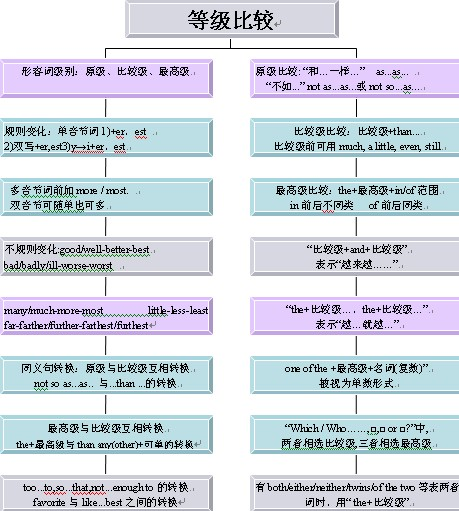
特殊形容词比较级变化:
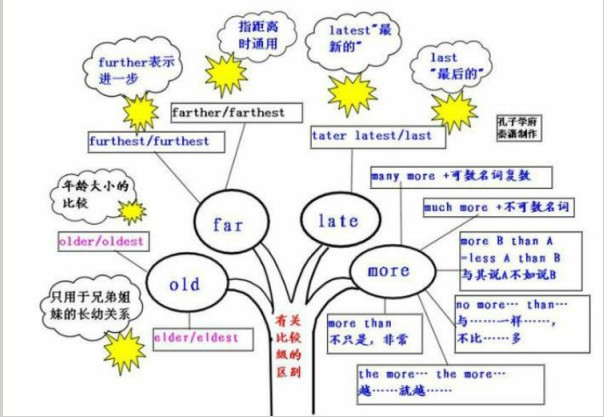
副词的概念:
副词是指在句子中表示行为或状态特征的词,用来修饰动词、形容词、其他副词、介词短语、非谓语动词乃至整个句子,表示时间、地点、程度、方式等概念。
副词的位置:
1)在动词之前。
2)在be动词、助动词之后。
3)多个助动词时,副词一般放在第一个助动词后。
注意:
a. 大多数方式副词位于句尾,但宾语过长,副词可以提前,以使句子平衡。
如:We could see very clearly a strange light ahead of us.
b. 方式副词well,badly糟、坏,hard等只放在句尾。
如:He speaks English well.
副词的排列顺序:
1)时间,地点副词,小单位的在前,大单位在后。
2)方式副词,短的在前,长的在后,并用and或but等连词连接。
如:Please write slowly and carefully.
3)多个不同副词排列:程度+地点+方式+时间副词。
注意:副词very可以修饰形容词,但不能修饰动词。
改错:(错)I very like English.
(对)I like English very much.
注意:副词enough要放在形容词的后面,形容词enough放在名词前后都可。
如:I don't know him well enough.
There is enough food for everyone to eat.
There is food enough for everyone to eat.
兼有两种形式的副词:
1)close与closely:
close意思是“近”;closely意思是“仔细地”。
如: He is sitting close to me.
Watch him closely.
2)late与lately:
late意思是"晚";lately意思是“最近” 。
如:You have come too late.
What have you been doing lately?
3)deep与deeply:
deep意思是“深”,表示空间深度;deeply时常表示感情上的深度,“深深地” 。
如:He pushed the stick deep into the mud.
Even father was deeply moved by the film.
4)high与highly:
high表示空间高度;highly表示程度,相当于much。
如:The plane was flying high.
I think highly of your opinion.
5)wide与widely:
wide表示空间宽度;widely意思是“广泛地”,“在许多地方”。
如:He opened the door wide.
English is widely used in the world.
6)free与freely:
free的意思是“免费”;freely的意思是“无限制地”。
如:You can eat free in my restaurant whenever you like.
You may speak freely, say what you like.
副词知识体系:
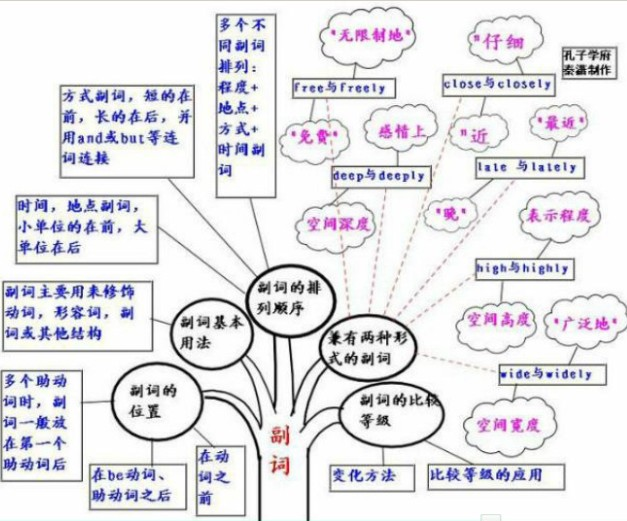
介词和介词短语的概念:
介词是一种用来表示词与词、词与句之间的关系的虚词,在句中不能单独作句子成分。介词后面一般有名词、代词或相当于名词的其他词类,短语或从句作它的宾语。介词和它的宾语构成介词词组,在句中作状语,表语,补语或介词宾语。介词可以分为时间介词、地点介词、方式介词和其他介词。
误用介词的三种情况:
1、多用介词:
多用介词可能是受汉语意思的影响将及物动词误用作不及物动词,也可能是受相关结构的影响而用错:
误:We discussed about the plan.
正:We discussed the plan. 我们讨论了计划。
误:Did he mention about the accident?
正:Did he mention the accident? 他提到那次事故了吗?
误:I saw her enter into the bank.
正:I saw her enter the bank. 我看见她进了银行。
误:He married with[to] a nurse.
正:He married a nurse. 他同一位护士结了婚。
误:How can contact with you?
正:How can contact you? 我怎么与你联系?
误:We should serve for the people heart and soul.
正:We should serve the people heart and soul. 我们应该全心全意地为人民服务。
误:Who controls over the factory? (但名词control可接over)
正:Who controls the factory? 谁管理这个工厂?
误:He has a great many of friends here. (比较a great number of)
正:He has a great many friends here. 他在这儿有很多朋友。
2、漏用介词:
漏用介词可能是受汉语意思的影响将不及物动词误用作及物动词,或是受相关结构的影响的影响而用错等:
误:This matter is difficult to deal. (deal with=处理)
正:This matter is difficult to deal with. 这事很难处理。
误:He is not a man to be depended.
正:He is not a man to be depended on. 他不是个可靠的人。
误:He took a cup of tea, and went on the story.
正:He took a cup of tea, and wentonwiththestory.他喝了一口茶,又接着讲故事。
误:My mother still regards me a child. (比较consider…as中的as可省略)
正:My mother still regards me as a child. 我母亲还把我当小孩看。
误:They insisted sending a car over to fetch us.
正:They insisted on sending a car over to fetch us.他们坚持要派车来接我们。
误:What he says is worth listening.
正:What he said is worth listening to.他的话值得一听。
3、错用介词:
错用介词的情况比较复杂,可能是因受汉语意思的而错,也可能是因弄不清搭配关系而错,可能是混淆用法而错,也可能是受相关结构的影响而错,可能是忽略语境而错,也可能是想当然的用错:
误:She called on his office yesterday. (call on+人,call at+地点)
正:She called at his office yesterday. 她昨天去了他办公室拜访。
误:He is engaged with a nurse.
正:He is engaged to a nurse.他与一位护士订了婚。
误:The sun rises from the east.
正:The sun rises in the east.太阳从东方升起。
误:Under his help, I finished it in time.
正:With his help, I finished it in time. 在他的帮助下,我及时做完了。
误:During he was in Japan, he visited many places.
正:During his stay in Japan, he visited many places.他在日本期间,参观过许多地方。
误:We are familiar to his character.
正:We are familiar with his character.我们了解他的性格。
误:Help yourself with the fruit.
正:Help yourself to the fruit.吃点水果吧。
介词的宾语:
1、名词或代词作介词宾语:
如:Are you interested in history? 你对历史感兴趣吗?
Don't worry about it. 别为它担心。
注:若是人称代词用作介词宾语,要注意用宾格。
如:No one can sing like her. 没有人能像她那样唱歌。(不能用like she)
2、动名词作介词宾语:
如:He is good at telling stories. 他善于讲故事。
In crossing the street he was run over. 他在穿过马路时被汽车撞倒。
3、过去分词作介词宾语:
如:We can't regard the matter as settled. 我们不能认为这事已经解决。
I take it for granted you have read the book. 我以为你读过这本书。
注:过去分词用作介词宾语通常只见于某些固定结构中,如上面第1句涉及regard…as(认为…是)结构,第2句涉及take sth for granted(认为某事属实)。在其他情况下,介词后通常不直接跟过去分词作宾语,若语义上需要接过去分词(表被动),可换用“being+过去分词”:
如:He went out without being seen by the others.他出去了,没有被其他人看见。
4、从句作介词宾语:
如:He was not satisfied with what she said. 他对她说的不满意。
I'm worried about where he is. 我担心他上哪儿去了。
注:介词后通常不接that从句,遇此情况需考虑用其他结构:
误:He paid no attention to that she was poor.
正:He paid no attention to the fact that she was poor. 他根本不注意她很穷这一事实。
但有个别介词(如except)可接that从句。
比较:I know nothing about him except that he lives next door./I know nothing about him except for the fact that he lives next door. 我只知道他住在隔壁,其它的就不知道了。
5、不定式作介词宾语:
如:I had no choice but to wait. 除了等,我没有别的选择。
He wanted nothing but to stay there. 他只想留在那儿。
They did nothing but complain. 他们老是一个劲地抱怨。
He never did anything but watch TV. 除了看电视,他从不干任何事。
注:(1)介词后接不定式的情形通常只见于but, except等极个别个词。该不定式有时带to,有时不带to,其区别是:若其前出现了动词do,其后的不定式通常不带to;
若其前没有出现动词do,则其后的不定式通常带to。
(2)介词后虽然通常不直接跟不定式作宾语,但却可接“连接代词(副词)+不定式”结构:
如:He gave me some advice on how to do it. 对于如何做这事他给我提了些建议。
6、形容词作介词宾语:
如:Her pronunciation is far from perfect. 她的语音远不是完美的。
In short, we must be prepared. 总而言之,我们要有准备。
Things have gone from bad to worse. 事情越来越糟。
注:(1)有些形容词用作介词宾语可视为其前省略了动名词being:
如:He regarded the situationas(being) serious. 他认为形势严重。
His work is far from(being) satisfactory. 他的工作丝毫不令人满意。
(2)有些“介词+形容词”的结构已构成固定搭配:in full全部地,全面地,无省略地; in private私下地,秘密地; in particular特别地;in general一般地,通常地,概括地; in brief 简言之;in short总之,简言之; in vain徒然地,徒劳无益地;for fee免费地,无偿地; for certain肯定地,确切地;for sure肯定地,确切地; for short为了简短,简称;atl arge自由自在地,逍遥法外; by far…得多
7、副词作介词宾语:
如:I can't stay for long. 我不能久呆。
It's too hot in here. 这里面太热了。
I looked every where except there. 除了那儿,我到处都看过了。
8、数词作介词宾语:
如:The city has a population of four million. 这座城市有四百万人口。
He was among the first to arrive. 他是第一批到的。
9、介词短语作介词宾语:
如:Choose a book from among these. 从这些书中选一本吧。
I saw her from across the street. 我从街的对面望见了她。
注:通常可后接介词短语作宾语的介词是from, till, until, since, except, instead of等。
比较:I took it from the bed. 我从床那儿(或床上)拿的。
I took it from under the bed. 我从床下拿的。
10、复合结构用作介词宾语:
如:She had no objection to Mary marrying him. 她不反对玛丽与他结婚。
She came in with a book in her hand. 她手里拿着一本书走了进来。
All the afternoon he worked with the door locked. 整个下午他都锁着门在房里工作。
介词短语的句法功能:
1、表语:
如:He was with a friend. 他和一个朋友在一起。
Health is above wealth. 健康胜过财富。
This knife is for cutting bread. 这把小刀是用于切面包的。
注:有些介词(如because of)引出的短语通常只用作状语,不用作表语:
误:His absence is because of the rain.
正:His absence is due to the rain. 他因雨未来。
但是,若主语是代词(不是名词),becauseof引出的短语可用作表语:
如:It is because of hard work. 那是因为辛苦工作的原因。
2、状语:
如:Don't touch it with your hands. 别用手去摸它。
Did you do this by design or by accident? 你这样做是有意的还是无意的?
3、定语:
如:This is his reply to your letter. 这是他给你的回信。
This is the best way of doing it. 这是做此事最好的方法。
My love for you is deeper than the sea. 我对你的爱比海深。
4、宾语补足语:
如:I found everythingin good condition. 我发现一切正常。
Her illness kept her in bed for a week. 她因生病在床上躺了一星期。
注:用作宾语补足语的介词短语在相应的被动语态中则为主语补足语:
如:He was regarded as a hero. 他被看成是英雄。
5、宾语:
如:A man stepped out from behind the wall. 一个人从墙后走出来。
He cannot spare anytime except on Sunday. 除星期日外,他抽不出时间。
6、主语:
如:Between6 and 7 suits me. 六点到七点对我比较适合。
After the exams is the time to relax. 考试后是轻松一下的时间。
注:介词短语通常不用作主语,尽管有时也像上面这样用作主语,但通常可视为是在一定的上下文中有所省略:
如:—When are we going to have the next meeting? 我们下次什么时候见面?
—On Tuesday may be convenient. 星期二可能比较方便。
此句中onTuesday虽用作主语,但可视为是其前省略了meeting一词:
即:Meeting during the vacation may be convenient.
现在分词的概念:
现在分词(PresentParticiple)(又称-ing形式),是分词的一种,是非限定动词,即在句子里面不能单独充当谓语,但能充当其它的一些成分(定语,表语,补语和状语)。一般式:doing;一般被动式:being done;完成式:having done;完成被动式:having been done。所有否定式都是在-ing前面加not。
现在分词的用法:
1)做表语:
如:He was very amusing.
That book was rather boring.
很多动词的现在分词都可以作表语:exciting, interesting, encouraging, disappointing, confusing, touching, puzzling.
2)作定语:
上面所出现的现在分词都可以用作定语,修饰一个名词:
如:That must have been a terrifying experience.
I found him a charming person.
现在分词短语还可以放在名词的后面修饰名词,相当于一个定语从句:
如:There are a few boys swimming in the river.
There is a car waiting outside.
3)作状语:
现在分词短语可以表示一个同时发生的次要的或伴随的动作:
如:Following Tom, we started to climb the mountain.
Opening the drawer, he took out a box.
Taking a key out of his pocket, he opened the door.
现在分词短语还可以表示原因,相当于一个原因状语从句:
如:Not knowing her address, we couldn't get in touch with her.
Being unemployed, he hasn't got much money.
现在分词短语还可以表示时间,相当于一个时间状语从句:
如:Hearing the news, they all jumped with joy.
Returning home, he began to do his homework.
Jim hurt his arm while playing tennis.
Be careful when crossing the road.
Having found a hotel, we looked for some where to have dinner.
Having finished her work, she went home.
4)作宾补:
现在分词在一些动词之后可以做宾语的补语:
例如:see, hear, catch, find, keep, have等。
如:I see him passing my house every day.
I caught him stealing things in that shop.
I smelt something burning.
She kept him working all day.
现在分词其他用法解析:
1、现在分词一般式的用法:
现在分词的一般式所表示的动作与主语动作同时发生:
如:When we arrived, we found him sleeping. 我们到达时发现他在睡觉。
Living in the 示的动作也可略早于或迟于谓语动作,但两者之间没有时间间隔:
如:Seeing nobody at home, he decided to leave a note. 发现没有在家,他决定留个字条。
He went home, finding the door locked. 他回到家,发现门是锁着的。当现在分词所表示的动作略迟于谓语动作时,现在分词通常位于句末。
2、现在分词完成式的用法:
现在分词的完成式主要表示发生在谓语动作之前的动作:
如:Having been there once, she knew the place quite well. 由于去过那儿一次,她对那地方很熟悉。
Having failed twice, he didn't want to try again. 他已经失败了两次,不想再试了。
注:(1)现在分词的一般式和完成式均可表示已完成或先于谓语的动作,但有区别:现在分词所表示的动作虽然可以先于谓语动作,但两者之间没有时间间隔,而现在分词的完成式所表示先于谓语的动作则与谓语动作有一定的时间间隔:
如:Locking the door, he went out. 锁好门之后,他就出去了。
Having invited him here to speak, we'd better go to his lecture. 既然我们请了他来作报告,我们最好去听一下。
有时即使是分词动作与谓语动作几乎同时发生,但如果要强调分词动作的完成性,也应用现在分词的完成式:
如:Having bought our tickets, we went into the theatre. 我们买好票后就走进剧场。
(2)现在分词的完成式一般不用作定语:
误:Do you know anyone having lost a cat? 你知道有谁丢了一只猫吗?
误:I want to talk to the person having broken the window. 我想同打破窗户的人谈谈。
若将以上现分词的完成式改为一般式也不可以(因为现在分词作后置定语时通常只表示与谓语动作同时或几乎同时发生的动作,而不能先于谓语动作而发生):
误:I want to talk to the person breaking the window.
3、现在分词被动式的用法:
当要表示一个被动动作时,现在分词就用被动形式。现在分词的一般式和完成式均有被动式形式:
(1)现在分词一般式的被动式:主要表示现在正在进行的动作,也可表示与谓语动作同时发生的动作:
如:Who is the woman being operated on? 正在动手术的女人是谁?
I saw him being taken away by the police. 我看见他被警察带走。
注:有时现在分词一般式的被动式所表示的动作也可发生在谓语动作之前(此时的现在分词通常用于表示原因,且多为状态动词):
如:Not having a car, he finds it difficult to get around. 由于没车,她感到行动很困难。
(2)现在分词完成式的被动式:主要表示发生在谓语动词之前且已经完成的动作。
如:The subject having been opened, he had to go on with it. 话题已经开始了,他不得不谈下去。
Having been written inhaste, the book has many mistakes. 这书因写得仓促,所以错误不少。
比较:Being so ill, she can't go to school. 由于病得那么严重,她不能去上学。
Having been ill for a long time, he needed time to recover. 由于病了很长时间,他需要一段恢复的时间。
过去分词的概念:
过去分词一般表示完成和被动的动作,只有一种形式。即:动词原形加-ed构成。
如:fallen leaves 落叶
boiled water 开水
I heard the door closed. 我听见门被关上了。
过去分词与现在分词被动式的区别:
两者均可表示被动,其区别主要在于它们所表示的时间概念不同,但有时它们也可表示相同的意思。
如:Written in haste, the book has many mistakes. 这书因写得仓促,所以错误不少。
Being written in haste, the book has many mistakes. 这书因写得仓促,所以错误不少。
Having been written in haste, the book has many mistakes. 这书因写得仓促,所以错误不少。
有时虽然所表示的时间概念相同,但有细微区别:
如:Having been show the lab, we left. 被领着看了实验室后,我们就离开了。
过去分词的句法功能:
1、作定语:
如:I don't like the book written by Martin.
Our class went on an organized trip last Monday. 上周一我们班开展了一次有组织的旅行。
注意:当过去分词是单词时,一般用于名词前,如果是过去分词短语,就放在名词的后面。过去分词做定语相当于一个被动语态的定语从句。
2、过去分词作表语:
如:They were very excited at the news. 听到这个消息,他们非常激动。
The window is broken. 窗户破了。
They were frightened at the sad sight. 他们对眼前悲惨的景象感到很害怕。
注意:be+过去分词,如果表示状态是系表结构,如果表示被动的动作是被动语态。
区别:The window is broken.(系表)
The window was broken by the boy.(被动)
有些过去分词是不及物动词构成的,不表示被动,只表示完成。
如:boiled water(开水) fallen leaves(落叶) newly arrived goods(新到的货) the risen sun(升起的太阳) the changed world(变了的世界)
这类过去分词有:gone, come, fallen, risen, changed, arrived, returned, passed等。
3、过去分词作宾语补足语:
如:I heard the song sung several times last week. 上周我听见这首歌被唱了好几次。
有时过去分词做with短语中的宾语补足语:
如:With the work done, they went out to play. 工作做完了,他们出去玩去了。
4、过去分词作状语:
如:Praised by the neighbours, he became the pride of his parents. 受到邻居们的表扬,他成为父母的骄傲。(表示原因)
Onceseen, it can never be forgotten. 一旦它被看见,人们就忘不了。(表示时间)
Given more time, I'll be able to do it better. 如果给予更多的时间,我能做得更好。(表示条件)
Though told of the danger, he still risked his life to save the boy. 虽然被告之危险,他仍然冒生命危险去救那个孩子。(表示让步)
Filled with hopes and fears, he entered the cave. 心中充满了希望与恐惧,他走进山洞。
5、过去分词与逻辑主语构成独立主格:
如:All books returned at the end of the term, the library assistant was satisfied. 所有的书期末时都还了,图书管理员很高兴。
The field ploughed, he began to spread seed. 地耕好了,他开始撒种子。
现在分词与过去分词的区别:
1、分词作表语:
分词做表语有两种情况,一种是现在分词做表语,一种是过去分词做表语,这两者区别是考试中经常考到的地方。一般来说,表示心理状态的动词如excite,interest等都是及物动词,汉语意思不是“激动”,“高兴”,而是“使激动”、“使高兴”,因而现在分词应该是“令人激动的”、“令人高兴的”,过去分词则是“感到激动的”和“感到高兴的”。所以,凡表示“令人……的”都是-ing形式,凡是表示“感到……”都用-ed形式。换句话说,若人对……感兴趣,就是somebody is in terestedi n...,若人/物本身有兴趣时,就是说sb./sth. is interesting。这类词常见的有:
interesting 使人感到高兴—interested感到高兴的
exciting令人激动的—excited感到激动的
delighting令人高兴的—delighted感到高兴的
disappointing令人失望的—disappointed感到失望的
encouraging令人鼓舞的—encouraged感到鼓舞的
pleasing令人愉快的—pleased感到愉快的
puzzling令人费解的—puzzled感到费解的
satisfying令人满意的—satisfied感到满意的
surprising令人惊异的—surprised感到惊异的
worrying令人担心的—worried感到担心的
如:Travelling is interesting but tiring. 旅行是有趣的,但是使人疲劳。
The pupils will get confused if they are made to learn too much. 如果要学生学得太多,他们会感到糊涂的。
The game is exciting. (现在分词作表语)
We were excited at the news. (过去分词作表语)
2、分词作定语:
分词作定语时有下面几个特点:
1)现在分词表示主动意义,过去分词一般表示被动含意。
2)现在分词表示正在进行,过去分词表示状态或做完(完成)的事。
如:He rushed into the burning house. 他冲进了正在燃烧着的房子。
The child standing over there is my brother. 站在那儿的男孩子是我弟弟。
The room facing south is our classroom. 朝南的房间是我们的教室。
He is an advanced teacher. 他是个先进教师。
3)下列不及物动词也以过去分词形式做定语或表语,但不具有被动意义,这点要注意:
departed, elapsed, faded, fallen, gone, frown-up, retired, returned, risen, set, vanished, much-traveled, newly-arrived, recently-come
3、分词作状语:
现在分词做状语与过去分词做状语的最主要区别在于两者与所修饰的主语的主动与被动关系的区别。
1)现在分词作状语时,现在分词的动作就是句子主语的动作,它们之间的关系是主动关系。
如:He went out shutting the door behind him. 他出去后将门随手关上。
Not knowing what to do, he went to his parents for help. 由于不知如何办是好,他去找父母帮忙。
Smiling, they came in.
2)过去分词作状语时,过去分词表示的动作是句子主语承受的动作,它们之间的关系是被动关系。
如:Cleaned, the room looks nice.
Given more attention, the trees could have grown better. 如果对这些树多关心一些,它们本来会长得更好。
Faced with difficulties, we must try to overcome them. 在遇到困难的时候,我们必须设法克服。
一般过去时的概念:
一般过去时表示过去某个时间里发生的动作或状态;过去习惯性、经常性的动作、行为;过去主语所具备的能力和性格。
一般过去时的用法:
1、表示过去发生的动作或存在的状态,常与表示过去时间的副词如:yesterday,last week,two hours ago等连用。
如:My family moved here five years ago. 我家五年前搬到了这里。
I was born in 1973. 我生于1973年。
2、表示过去一段时间经常或反复发生的动作。这时可与频度副词如:often,usually,always等连用。
如:He always worked in tonight those days. 那些日子他总是工作到深夜。
I often left on business in 1987. 1987年我经常出差。
注:表示“过去经常,而今不再”时,要用usedto.
如:I used to read newspaper after breakfast. 我过去经常早饭后看报纸。(意指现在已不是这样)
The children often swam in this river. 孩子们过去经常在这条河里游泳。
3、表示过去发生的一连串动作。
如:He put down the heavy box, took out the keys, and opened the door. 他放下这沉重的箱子,掏出钥匙开了房门。
注:过去发生的一连串动作,若用and,or,but等并列连词连接,则一律用过去式。
如:They moved the chairs to the table, sat down and began to have supper. 他们把椅子搬到桌边,坐下开始吃饭。
4、在时间和条件状语从句中,用一般过去时表示过去将来的动作。
如:He said that he would let me know as soon as he got the information. 他说他一得到消息就立即让我知道。
Mary told me that she would stay at home if it rained. 玛丽告诉我如果下雨她就呆在家里。
一般过去时的特别用法:
1、句型:It is time for sb. to do sth "到……时间了" "该……了"。
例如:It is time for you to go to bed.你该睡觉了。
It is time that sb.did sth. "时间已迟了" "早该……了"。
例如:It is time you went to bed. 你早该睡觉了。
2、would(had)rather sb.did sth. 表示'宁愿某人做某事'。
例如:I'd rather you came tomorrow. 还是明天来吧。
3、wish, wonder, think, hope等用过去时,作试探性的询问、请求、建议等,而一般过去时表示的动作或状态都已成为过去,现已不复存在。
例如:I thought you might have some. 我以为你想要一些。
比较:Christine was an invalid all her life.(含义:她已不在人间。)
Christine has been an invalid all her life.(含义:她现在还活着)
Mrs. Darby lived in Kentucky for seven years.(含义:达比太太已不再住在肯塔基州。)
Mrs. Darby has lived in Kentucky for seven years.(含义:现在还住在肯塔基州,有可能指刚离去)
注意:用过去时表示现在,表示委婉语气。
1)动词want, hope, wonder, think, intend等。
例如:Did you want any thing else? 您还要些什么吗?
I wondered if you could help me. 能不能帮我一下。
2)情态动词could, would。
例如:Could you lend me your bike? 你的自行车,能借用一些吗?
现在完成时的概念:
现在完成时用来表示之前已发生或完成的动作或状态,其结果的影响现在还存在;也可表示持续到现在的动作或状态。其构成:have(has)+过去分词。
现在完成时共有四种主要用法:
一、现在完成时表示影响:
该用法的现在完成时表示一个过去发生的动作在过去已经完成,并且这个过去发生并完成的动作对现在有影响或结果,同时说话者强调的或感兴趣的就是这个影响或结果,如汉语说“他已离开这个城市了”,其中的“离开”肯定发生了,它对现在的影响或结果就是“他现在已不在这个城市了”;又如汉语说“有人把窗户打破了”,显然“打破窗户”这一动作发生在过去,并且在过去已经完成了,但说话人强调的重点是打破窗户对现在的影响—窗户现在仍是破的。
如:He has left the city. 他已离开这个城市。(结果:他不在这个城市。)
Someone has broken the window. 有人把窗户打破了。(结果:窗户仍破着。)
I have lost my pen. 我把钢笔丢了。(结果:我现在无钢笔用。)
He has finished his work. 他把工作做完了。(结果:他现在可以做其他的事了。)
二、现在完成时表示持续:
该用法的现在完成时表示一个过去发生的动作或开始的状语在过去并未完成或结束,而是一直持续到现在,并且有可能继续下去(也可能到此结束),如汉语说“他在我们学校教书已有30年了”,显然“他在我们学校教书”是从30年前开始,并且一直教到现在,已经持续了30年;又如汉语说“自上个星期以来他一直很忙”,显然“忙”是从上个星期开始的,并且这一“忙”就一直忙到现在。
如:He has taught in our school for 30years. 他在我们学校教书已有30年了。
He has been busy since last week. 自上个星期以来他一直很忙。
He has worked for us ever since he left school. 他离开学校以后就一直为我们工作。
三、现在完成时表示重复:
即表示从过去某个时间直到现在的这个时间范围内不断重复发生的动作或情况,并且这个不断重复的动作有可能继续下去,也有可能到现在就结束。
如:How often have you seen her? 你隔多少见她一次?
My father has always gone to work by bike. 我父亲一向骑车上班。
四、现在完成时表示将来:
同一般现在时可以表示将来一样,现在完成时也可以在时间状语从句里表示将来。
如:I'll wait until he has written his letter. 我愿等到他把信写完。
When you have rested, I'll show you the garden. 等你休息好之后,我领你看我们的花园。
现在完成时知识体系:
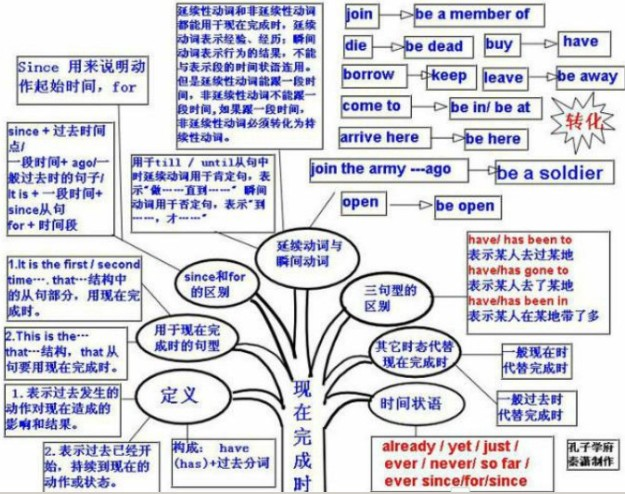
比较一般过去时与现在完成时:
1)一般过去时表示过去某时发生的动作或单纯叙述过去的事情,强调动作;现在完成时为过去发生的,强调过去的事情对现在的影响,强调的是影响。
2)一般过去时常与具体的时间状语连用,而现在完成时通常与模糊的时间状语连用,或无时间状语。一般过去时的时间状语:yesterday, last week,…ago, in1980, in October, just now等,皆为具体的时间状语。现在完成时的时间状语:for, since, sofar, ever, never, just, yet, till/until, up to now, in past years,always等,皆不确定的时间状语。共同的时间状语:this morning, tonight, this April, now, already, recently, lately等。
3)现在完成时可表示持续到现在的动作或状态,动词一般是延续性的,如live, teach, learn, work, study, know。一般过去时常用的非持续性动词有come, go, leave, start, die, finish, become, get married等。
例如:I saw this film yesterday.(强调看的动作发生过了)
I have seen this film.(强调对现在的影响,电影的内容已经知道了)
Why did you get up so early?(强调起床的动作已发生过了)
Who hasn't handed in his paper?(强调有卷子未交,疑为不公平竞争)
He has been in the League for three years.(在团内的状态可延续)
He has been a League member for three years.(是团员的状态可持续)
句子中如有过去时的时间副词(如yesterday, last, week, in1960)时,不能使用现在完成时,要用过去时。
(错)Tom has written a letter to his parents last night.
(对)Tom wrote a letter to his parents last night.
一般过去时被动语态的概念:
表示过去经常性、习惯性被动动作或过去某一时刻发生的被动性动作。主语(动作承受者)+was/were+过去分词(+by+施动者)构成。
一般过去时被动语态与现在完成时被动语态用法区别:
现在完成时与一般过去时被动语态均指某一被动性动作发生在过去,但现在完成时被动语态强调发生在过去的被动性动作对现在造成影响,或发生在过去的被动性动作一直延续到现在并有可能继续延续下去。一般过去时被动语态表示过去经常性、习惯性被动动作或过去某一时刻发生的被动性动作。
例如:This machine has been repaired. 这台机器已被修好。
析:这台机器在过去某一时刻被修,并对现在造成影响,说明这台机器现在已无毛病,可以投入使用。
例如:This building has been built for a month. 这幢楼房已被建一个月。
析:这幢楼房一个月之前开始被建,一直延续到现在并有可能继续下去。
例如:This bridge was built last year. 这座桥是去年建的。
析:该句仅强调这座桥是去年被建造的。
例如:Volleyball was often played in this playground. 这个操场上过去经常有人打排球。
析:该句强调在这个操场打排球是过去经常性、习惯性动作。
与“短文改错。 For a writer, there is hardly any great honour...”考查相似的试题有:
- ----Who is your favorite basketball player in China?----Yao Ming, of course. No one plays __________.A.betterB.best...
- _______, I lost heart in English learning, but my teacher often said to me, "Keep on working hard andyou'll succeed "...
- Owing to her balanced diet and regular exercise, she is very slim and athletic _____.A.in heightB.in shapeC.in det...
- They asked to be treated equally other people in all ways.A.asB.withC.toD.like
- Lincoln died ____ the morning ___ April 15, 1865.A.in…onB.on….inC.in…..inD.on….on
- With so many people ____ the Internet, it is difficult to see online movies at the same time.A.surfB.to surfC.surf...
- .The visitors did nothing but ______ tea and ______ to each other.A.drinking; talkingB.drink; talkC.to drink; to t...
- --- What are you going to do this weekend ?--- I’m thinking of finishing _____ the English book bought in Being.One ...
- Thousands of athletes______ in many countries will compete _______ medals in the 2008 Olympic Games in Beijing.A.inv...
- I still remember________to the Famen Temple and what I saw there.A.to takeB.to be takenC.takingD.being taken